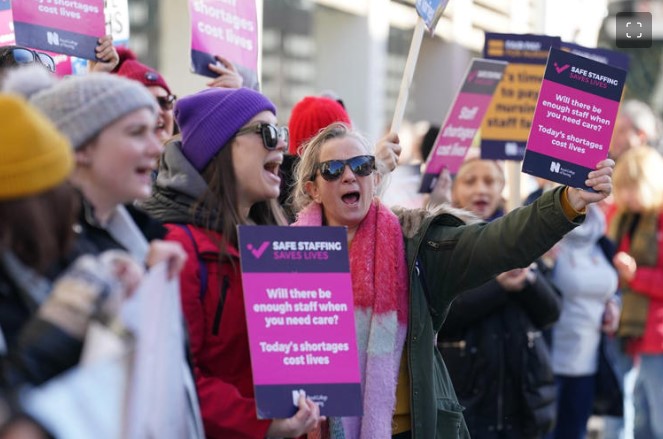Nurses’ strikes: Is more industrial action on the way as ballot result looms?

Nurses could be going on strike again, according to the Guardian, after the Royal College of Nursing (RCN) had earlier paused industrial action to enter talks with the government.
Here’s what you need to know.
Why might nurses be striking again?
RCN members are expected to reject the government’s pay offer as part of their long-running dispute over wages.
It is thought the Royal College of Nursing member will vote against it – even though the union’s leadership has advised members to accept the deal, with the RCN’s general secretary, Pat Cullen, branding it the “final offer”.
The deal involves a one-off lump sum payment of between £1,655 and £3,789 depending on pay band and a 5 per cent pay rise for the next financial year.
The result of the ballot is expected on Friday, the same day as approximately 47,000 junior doctors strike for the fourth day in a row over pay.
Unison – which represents nurses and other health workers – is also holding a ballot on the deal and advised its members to accept the deal.
When will the nurses’ strike be?
The details of the nurses strikes are yet to be revealed but it has been reported that the strikes could last until Christmas. The RCN is expected to publish the results this afternoon.
A spokesman for the RCN said: “The vote has closed and the figures are being verified. There is no result until that point. We will make an announcement later today and tell our members first.”
According to the Guardian, members have voted against the deal, and the union could be planning a new vote to secure more strikes for six months.
What has the reaction been?
Ministers were hoping the deal with the RCN would put an end to further industrial action.
Shadow Treasury minister James Murray said the government should be ready to negotiate if the pay deal is rejected.
“Let’s see what happens and the results of that ballot. But what we’ve said throughout the dispute with the nurses’ pay, and also in terms of all the other sectors of the economy where industrial action has happened or is threatened, is that the government needs to be ready to negotiate,” the Labour MP told Sky News.
“There has to be compromise. There has to be a deal, but it’s in the public’s interest as well as the interest of the workers concerned to get a deal and to avoid strikes going ahead.”
He added that Labour does not want strikes, which are “damaging to patients”, the NHS and the workers, to go ahead. It also creates the prospect that nurses, paramedics and junior doctors could all strike at the same time, leading to unprecedented disruption.
Matthew Taylor, chief executive of NHS Confederation, said it was “vitally important” that the Government and health unions do not get back into an “entrenched position” if the pay deal is rejected.
“I would really encourage both the trade unions and the Government can get straight back into talks. A rejection of the deal is bad news, and we need to respond to this creatively so that we can avoid further industrial action.”







